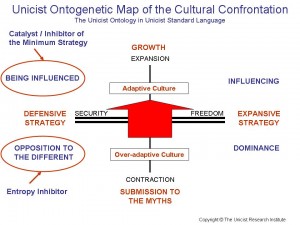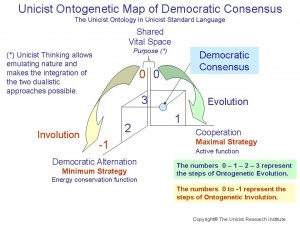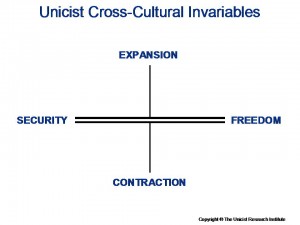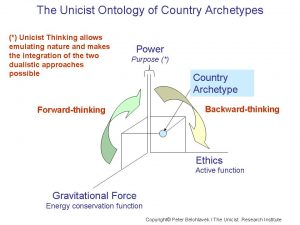Cultural confrontation: the clash between adaptive and over-adaptive cultures
The root cause of the clash between cultures is in fact the confrontation between over-adaptive and adaptive cultures. Over-adaptive cultures are naturally driven by a dualistic approach which drives them to consider enemies all those that are different or have a superior level of adaptiveness.
On the other hand, adaptive cultures are driven by integrative approaches that allow them influencing the environment while being influenced by it.
The apparent paradox is that while adaptive cultures include over-adaptive behaviors in order to accept the influence of the environment, over-adaptive cultures are dualistic and cannot accept adaptive behaviors within their boundaries.
That is why adaptive cultures are able to generate added value while over-adaptive cultures need to survive based on the appropriation of value.
Obviously, the confrontation is generated by the over-adapted cultures that need to transform the adapted ones into enemies in order to justify their attitude towards the appropriation of value.
This confrontation is in fact the battle between evolution and involution, which generates opposite and incompatible positions that can only be overcome by the acceptance that adaptiveness is a goal to be achieved.
Adaptiveness requires necessarily a double dialectical equilibrium that fosters change on the one hand while it provides an energy conservation function to establish a stable equilibrium.
Evolution – About adapted cultures
Cultural adaptiveness is the central gravitational force that fosters expansion. It is homologous to institutional expansion processes. The core of the adaptive behavior is to make growth in an environment possible.
 The unicist ontological structure of adaptiveness includes counterintuitive elements that make it difficult to apprehend because of the pre-concepts people have. The final purpose of cultural adaptiveness is to achieve growth using influence on the environment to produce it.
The unicist ontological structure of adaptiveness includes counterintuitive elements that make it difficult to apprehend because of the pre-concepts people have. The final purpose of cultural adaptiveness is to achieve growth using influence on the environment to produce it.
Over-adaptation works as a driver for cultural degradation but also as an energy conservation function in adaptive environments, a fact that can be considered counterintuitive. That is why over-adaptation can only be apprehended if it is experienced.
The final objective of adaptive behavior is to grow. It is self-evident that if a system grows it is because it appropriates more energy than the energy the system consumes.
This concept of growth needs to be understood in order to be able to differentiate the cost of things from their value. Value judgments need to be left aside in order to apprehend the concept of growth.
It is necessary to be adapted to an environment in order to manage the growth equation in an equilibrated way making an institution grow based on the added value and not only on the appropriated value.
Value adding differentiation requires the use of technology and innovation. That is why cultural adaptiveness drives naturally towards the development of technologies and the fostering of innovations.
It implies necessarily going beyond existing boundaries which is a basic characteristic of the actions that drive towards growth.
This requires necessarily knowing the scenario where the expansion is taking place, the possibilities the environment offers and their evolution. Adaptive growth requires having a future scenario of the context and not only being driven by reactive actions.
The educational system of a culture defines if the future generations are being prepared to adapt to the environment.
Dynamic Equilibrium: Learning to adapt
Dynamic equilibrium implies adapting to reality which implies a permanent accommodation process in order to generate the necessary complementation or supplementation with the environment.
Dynamic equilibrium requires using the double dialectical logic to approach reality which is based on the conjunction “and” without the existence of disjunctions. This allows individuals to influence the environment while they are being influenced by it.
See more: www.unicist.net/clipboard
It requires having a structural approach in order to be able to apprehend the fundamentals of reality and a functional approach in order to measure them in terms of results. In a dynamic equilibrium environment things are not true or false, but functional or dysfunctional.
Dynamic equilibrium requires dealing with reality as a complex adaptive system. This implies that the structure of the complex adaptive system, defined by a purpose, an active function and an energy conservation function, needs to be apprehended.
This apprehension requires the use of the double dialectical logic which demands using the unicist double dialectical thinking. This approach allows apprehending complex adaptive systems in their nature and transforming them into systemic systems making the necessary compromises without leaving aside their essential structure while measuring the results that are being achieved.
Adaptiveness has naturally a high level of entropy. The level of entropy is high because it needs to work within a complex adaptive system where the needs of the institution or culture and its environment need to be integrated.
Institutions and cultures need to establish the system that defines their structure. It can be said that the basics of countries considered as adaptive systems are given by their constitutions and the basics of institutions are given by their visions.
Constitutions and visions are functional when they are consistent with their real archetypes. They produce the conditions for a structural over-adaptation when they are not consistent.
Involution avoidance – About over-adapted cultures
Involution is driven by the over-adaptation of a culture. Over-adaptive behavior hinders the possibility of the members of influencing an environment in an adaptive way.
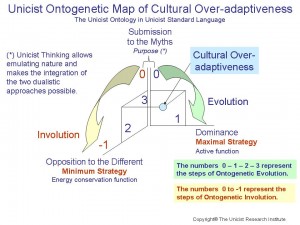 Involutionary cultures are put into action by a survivors’ ethics that allows its members to survive within an environment they consider hostile. Over-adaptation is, by definition, a conflictive approach with the environment.
Involutionary cultures are put into action by a survivors’ ethics that allows its members to survive within an environment they consider hostile. Over-adaptation is, by definition, a conflictive approach with the environment.
The cultures that are in an involution process need to deny it and transform the context into an enemy in order to be able to profit from the environment without needing to influence it by adding value.
The driver of over-adaptiveness is the submission to the myths and fallacious myths of a culture. While myths establish non-conscious rules for human behavior, fallacious myths are fallacies and utopias that are built to cover the weaknesses of a group or culture.
A culture becomes stagnated when it behaves in a fully submissive way. Involution is generated because the context evolves and the society stands still.
Dominating in order to profit from the environment is a natural behavior in stagnated cultures. Over-adaptation also requires eliminating all those who are different because they make the involution evident.
Conjunctural domination makes the societies feel that they are evolving. Domination is an attitude that is praised in these cultures.
The maximal strategy in involutionary cultures is to survive. Surviving is an extreme effort when a culture involves. That is why involution generates survivors. The paradox is that survivors cannot influence the environment to change the trend towards evolution.
The catalyst for cultural involving processes is given by the capacity of survivors to accumulate wealth and hold it.
That is why wealth in involving cultures needs to be tangible and controllable. Involving cultures do not believe in science and technology because they are abstract and cannot be held. Intellectual property is disregarded.
The educational system of a culture defines if the next generations are being limited in their adaptiveness or not.
Static Equilibrium: Teaching to over-adapt
The use of dualistic logic, based on the confrontation of positions, using the disjunction “or” to deal with reality, drives individuals to a static equilibrium where their opinions prevail.
Dualistic thinking, following the natural behavior of neurons, is the less energy consuming thinking process. This drives naturally towards an over-adaptive behavior which implies submitting, dominating or opposing to the environment.
Dualistic logic generates naturally aprioristic fallacies to deal with the environment which allows individuals to build a parallel reality that works as a comfort zone where they have no need of adapting. Domination, submission and oppositions are the alternatives they manage to feel safe.
Dualistic dialectics is the justification of the actions of individuals when they need to remain in a static equilibrium.
The positive aspect is that static equilibrium allows managing reality as a systemic model based on cause-effect relationships although complexity cannot be apprehended.
Static equilibrium is necessary to deal with methods and supernatural and religious thinking. That is why the basic educational system is based on teaching static processes in order to allow people to access the world of work.
Growing from Over-adaptiveness to Adaptiveness
The change of a culture from an involutionary trend towards an evolutionary trend is generated by the upgrade of the level of ethics in a culture.
This requires the installation of a heroic leader in the society. This heroic leader is a sort of messiah and that is why involving cultures are always seeking for a messiah.
Because of their need to change the trend, the members of these societies buy from psychopathic leaders the promise that they will introduce the change. The result is the next degradation.
If a hero appears and makes the turnaround of an involution trend, s/he has to “disappear” after his/her work is finished in order to make the stabilization of the trend possible.
Involution is maintained when heroes remain in power and are only “the other side of the coin”.
The confrontation with adaptive cultures is the natural alternative when the way to expand towards an adaptive behavior is perceived as impossible.
Peter Belohlavek
NOTE: The Unicist Research Institute was the pioneer in complexity science research and became a private global decentralized leading research organization in the field of human adaptive systems. http://www.unicist.org
